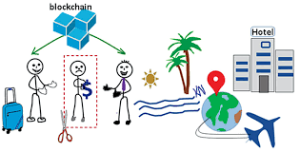Blockchain is emerging as a powerful technological force that promises to change the status quo in the travel industry. In fact, blockchain is already heralded as a game changer for many different industries. Remember that blockchain is a type of database commonly used in the cryptocurrency market where data is stored in blocks and then linked together. In this article, we talk about the connection between blockchain and travel.
Blockchain-based services using this technology are currently isolating the main bottlenecks in the highly fragmented travel and tourism industry. It is not surprising that this section is divided into different sections. Think about flights, hotels, car rentals and other factors. So how can blockchain help the travel and tourism industry? These services can reduce barriers in the industry by solving common challenges and simplifying processes while creating a fairer ecosystem that avoids industry giants.
The connection of blockchain and travel
However, the impact of this technology and the connection of blockchain and travel is more than hypothetical as there are businesses disrupting multiple nodes in the industry’s supply chain. The following five companies are improving key aspects of the travel ecosystem and establishing blockchain’s place in the industry.
1) Winding Tree: online booking hub
Companies that provide major travel services such as Expedia and Priceline are known as the dominant companies and giants of the tourism and travel industry in booking plane tickets and other services, but the costs associated with the tourism industry are very serious for travelers and airlines. Booking through these websites often involves additional fees, which is not out of the question due to their largely unchallenged status as the industry standard bearer and gatekeeper. Blockchain-based startup Winding Tree is working to disarm these entrenched giants by challenging their role as industry middlemen, and is one of the first companies to demonstrate the connection between blockchain and travel. have given.
Winding Tree is a private company based in Switzerland. Founded in 2017, the company has access to multiple segments of the travel and tourism industry, including hotels and airline tickets. This company uses “Blockchain technology to create a fair and competitive travel distribution market”.
With the LÍF token, the company seeks to connect travelers directly with service providers such as airlines, hotels and tour guides. The goal is to minimize costs for passengers while reducing costs for service providers.
The company’s smart use of smart contracts and the ERC-827 protocol will provide better savings for every stakeholder in the travel and tourism industry. Winding Tree’s non-profit status ensures that there are no middlemen who add unnecessary costs to the booking process.
2) Webjet: Adding guarantees and preventing mistakes
Incorrect or lost hotel reservations add significant stress and anxiety to travelers’ travel experience. When this happens, customers typically have to accept costs across multiple layers of the supply chain while providers continually extract value.
Thanks to blockchain’s immutable distributed ledger technology, WebJet has designed a new model to avoid these annoying booking experiences and provide yet another example of the connection between blockchain and travel. The company is a leading online travel agency based in Australia and was established in 1998. Webjet claims to be Australia and New Zealand’s leading online agency and leader in online tools and technology.
Webjet officially launched its blockchain platform in 2019. The system enhances the customer experience by recording all entries in an immutable blockchain ledger, which reduces the possibility of mistaken or lost bookings and reduces the layers between sellers and consumers. It does this by quickly locating data problems that may occur between customers, agents and hotels and sending messages to each party.
The improved security features of this technology provide better ecosystem protection. In addition to creating more efficiency in the supply chain and reducing costs for hotels, travelers ultimately benefit from cheaper reservations along with greater transparency and accountability. Webjet enables customers to compare, combine and book the best domestic and international travel deals, hotel stays, vacation packages, travel insurance and car rentals worldwide. Webjet support team is always available to customers 24 hours a day. They can connect with a trained travel support team member at any time of the day with a variety of contact options.
3) Sandblock: improving the ability to switch loyalty (changing the landscape of customer loyalty)
Loyalty awards have been repeated several times in a competitive industry such as the travel and tourism industry. Many frequent travelers depend on airline and hotel loyalty programs. Despite high participation rates in loyalty programs, many customers are willing to accept better deals and offers from competing carriers and service providers if the price is right.
Sandblock is one of the newest companies to enter this sector of the industry. Founded in 2017, Sandblock is based in France. It aims to change the landscape of customer loyalty with its blockchain-based platform, allowing travel providers to create their own loyalty tokens that can be exchanged for brand-specific rewards. Not only that, but they can be used like real coins and exchanged for fiat money.
4) Accenture: Striving for shorter lines
Spending hours waiting in line at airports is one of the most annoying aspects of travel around the world, not only for passengers, but also for airlines and airport staff. Congestion can add to the time spent in security, customs and passport control queues. Security needs are also raised as the reason for tighter controls and surveillance, all of which add to the frequent headaches of travelers.
To overcome these challenges and speed up the security process, Accenture (ACN) developed the well-known Digital Passenger Identification System. The consulting firm partnered with the World Economic Forum (WEF) to help disrupt the global travel industry, leveraging the connection of blockchain and travel.
This blockchain is designed to collect and host identification information from international travelers, enabling a freer flow of data between travelers and customs officials to facilitate the clearance process.
5. TravelChain: optimal use of data
Data is a valuable commodity in today’s economy that, when used appropriately, can provide business insights and benefits. Passenger-generated data, which is extremely valuable to service providers, is generally limited to leading companies such as Expedia and Orbitz. These companies offer a faster booking process at a price. This increases costs and adds to information asymmetry for service providers.
TravelChain is an up-and-coming blockchain and travel communications company that wants to advance the paradigm with an open source blockchain. This Russian company seeks to eliminate middlemen in the supply chain. Users have the option to collect and monetize their travel data, protect it from prying eyes, and receive tokens as compensation for sharing it with travel service providers.











